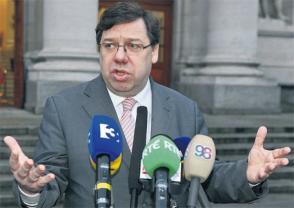Cowen’s claims of non-responsibility for Anglo don’t add up

Michael Somers was head of the National Treasury Management Agency (NTMA) from 1990 until recently - almost 20 years.
The NTMA was responsible for the management of the national debt and held on deposit hundreds of millions of euro in various banks at any one time.
At a meeting of the Dáil Committee of Public Accounts (CPA) on May 14 last, he said: ‘‘We [in the NTMA] always had certain reservations about Anglo Irish Bank because it was a kind of mono-line activity that lent to a particular sector.. . It always seemed to me that Anglo Irish Bank paid too much on deposits and charged too much when lending out ... We had counterparty credit limits of upto €200 to €300 million on so-called good banks.
‘‘I am not breaching any confidence by saying now that we were always hesitant about Anglo Irish Bank. We came under great pressure to create a limit for Anglo and to place money with it. The largest limit we went to for Anglo Irish Bank was €40 million. That was as high we were prepared to go."
Prop
When asked who put the pressure on, he replied: ‘‘The bank. It wanted us to have a bigger limit and to place more cash with it. We could not necessarily knock the bank back.
We did not know about all its inside operations or anything like that, but we were never comfortable with Anglo Irish Bank."
Is it believable that Somers or anyone else at NTMA never conveyed their reservations about Anglo Irish Bank to anybody in the Department of Finance, or to any finance minister, throughout all the time it ‘‘always’’ had reservations about Anglo Irish Bank?
Especially given that the NTMA would have regular contact with the Department of Finance and regular contact with Brian Cowen when he was minister for finance (2004-2008). Somers himself would have met Cowen several times a year at social functions. Is it credible he would not have said something about Anglo Irish Bank?
Is it believable that no one in Anglo Irish Bank - and especially those who had a friendship with Cowen - mentioned to him, when he was minister for finance, that the NTMA was treating Anglo Irish Bank badly by not placing much money on deposit with it?
The NTMA was depositing up to €300 million with any one of the ‘‘good’’ banks - presumably with AIB and Bank of Ireland among others - but only up to €40 million with Anglo and that only after pressure had been applied.
If it is the case that Cowen was told about the NTMA’s anxieties about Anglo Irish Bank and acted immediately to instigate an inquiry into Anglo Irish Bank or get the financial Regulator or the Central Bank to do so, isn’t it amazing that we haven’t heard anything about it since the controversy over Anglo erupted?
The only plausible scenario is that he was notified and did nothing at all.
Further questions arise from the collapse of the stock market on St Patrick’s Day in 2008, when Anglo Irish Bank suffered a 15 per cent drop in its share price in a single day. The panic that drove this started in the US with the crisis over Bear Stearns.
But the spectacular fall in Anglo shares must, or should, have raised alarm bells, especially as many observers pointed out that Anglo’s dependence on the property market made it specially vulnerable. How is it that nothing happened then either?
This is all the more surprising given that the collapse in the Anglo share price validated the concerns in the NTMA about the viability of Anglo.
There is an additional factor: the bank guarantee of September 30, 2008. It is now apparent that a panic decision was taken on the night of September 29 to guarantee the deposits and loans to all the financial institutions, including Anglo Irish Bank - even though a tentative decision had been taken some time earlier to nationalise Anglo Irish Bank at that stage, for a draft bill to do just that was prepared and ready to go.
But, for some unexplained reason, that strategy was discarded; the most extensive guarantee in the eurozone (according to Patrick Honohan, now the governor of the Central Bank) was given to all the banks, much to the chagrin of Germany, Britain and the EU Commission.
The consequence of all this has been catastrophic. Up to €22 billion will have been invested in Anglo by the state on top of the cost of the National Asset Management Agency off-loading of its toxic loans, plus the fall-out from the crisis in Quinn Insurance. Cowen personally carries much of the blame for this gigantic debacle.
But is this treason? A betrayal of one’s nation? A subversion of the government of the day, of which he was a member? Making war against one’s own country? Treason, previously punishable by being hanged, drawn and quartered (if a man) or burned at the stake (if a woman). Condemned to the lowest circle of hell?
Certainly not intentionally a subversion of the government of which he was a member but, again arguably, that may be a consequence of his negligence.
An act of war? Hardly.
Punishable by being hanged, drawn and quartered? A little over the top. But being required to relinquish his position as Taoiseach and retire to the back benches and, after the next election, return to a solicitors practice in Birr? Certainly.
